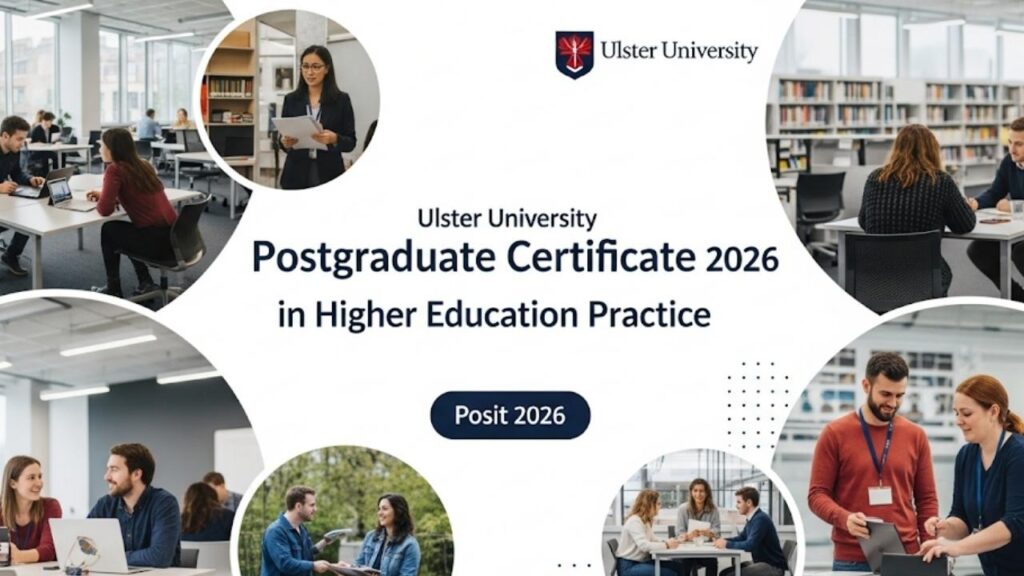Embarking on the Ulster University Postgraduate Certificate 2026 in Higher Education Practice is a pivotal step for any academic professional aiming to transform their teaching from a practice into a craft. You might be a new lecturer finding your footing, a seasoned researcher looking to enhance student engagement, or a clinical educator wanting to formalize your skills. This guide is designed to walk you through every aspect of this transformative programme, providing the clarity and encouragement you need to confidently begin your journey toward pedagogical excellence.

Ulster University Postgraduate Certificate 2026 in Higher Education Practice
| Key Feature | Detail | Why It Matters |
| Professional Accreditation | Accredited by Advance HE, leading to Fellowship (FHEA). | FHEA is an internationally recognised benchmark for high-quality teaching in higher education, boosting your professional standing. |
| Flexible Delivery | Primarily delivered online with some on-campus options, designed for working professionals. | You can balance your studies with your existing teaching and professional commitments without putting your career on hold. |
| Practice-Based Learning | The curriculum is deeply rooted in your own teaching context and practice. | This isn’t just theory; it’s a practical toolkit you can apply and refine in your classroom, lab, or clinic immediately. |
| Supportive Community | Learn alongside a multidisciplinary cohort of peers from various academic fields. | Gain diverse perspectives and build a valuable professional network of fellow educators committed to excellence. |
What Exactly Is the PGCert in Higher Education Practice?
Think of this qualification as the professional standard for teaching and supporting learning in a university setting. Gone are the days when being a subject matter expert was enough. Today, higher education demands practitioners who are not only masters of their field but also skilled, reflective, and innovative educators.
This programme is a formal teaching qualification for higher education UK-wide and beyond. It equips you with the pedagogical theory, practical strategies, and reflective frameworks necessary to design and deliver outstanding learning experiences. It’s about moving beyond what you teach to mastering how you teach.

Why Choose Ulster University for Your Professional Development?
Choosing where to undertake your professional development is as important as the decision to do it. Ulster University stands out for several key reasons:
A Curriculum Built for the Real World
Ulster’s approach is refreshingly pragmatic. The course is built around a work-based learning model, meaning your own teaching practice is the central case study. You won’t just be reading about educational theories; you’ll be applying them, testing them, and reflecting on their impact in your specific context. In my experience advising academic professionals, this direct application is what separates a good course from a great one—it ensures the learning sticks.
Earn International Recognition
Upon successful completion of the first two modules, you’ll be eligible to apply for Fellowship of the Higher Education Academy (FHEA). This is a globally respected credential that demonstrates your commitment to professional practice and high-quality teaching. According to Advance HE, holding a Fellowship can significantly enhance your career prospects both within the UK and internationally.
A Flexible and Supportive Environment
Ulster understands that its students are busy professionals. The course is designed with flexibility at its core, offered on a part-time basis and delivered through a blend of online learning and on-campus workshops. This allows you to integrate your studies seamlessly with your work and personal life.
Diving Deep: Course Structure and Core Modules
The Ulster University Postgraduate Certificate 2026 in Higher Education Practice is typically completed over one academic year (part-time) and comprises 60 credits at the postgraduate level.1 The curriculum is structured to build your expertise progressively.
Here’s a look at the typical module structure:
- Module 1: Teaching and Learning in Higher Education (30 credits)
- This foundational module explores the core principles of effective teaching. You’ll delve into learning theories, curriculum design, assessment strategies, and methods for creating inclusive learning environments. The focus is on developing a reflective and evidence-informed approach to your practice.
- Module 2: Developing Professional Practice (30 credits)
- Building on the first module, this part of the course encourages you to critically evaluate and enhance your ongoing professional development. It involves undertaking a small-scale, work-based research project related to your own teaching, allowing you to innovate and contribute to your field.
Who Is This Programme For?
This certificate is designed for a broad range of professionals involved in teaching and supporting learning in higher education. You are an ideal candidate if you are:
- A new academic staff member with teaching responsibilities.
- An experienced lecturer looking to refresh your skills and gain a formal qualification.
- A clinical practitioner or professional who teaches or supervises students in a higher education context.
- A researcher (e.g., Postdoctoral Fellow) with some teaching or demonstrating duties.
- A learning support professional, such as a learning technologist or academic librarian.
Your Path to Enrolment: Entry Requirements & Application
Navigating the application process can feel daunting, but it’s a straightforward process if you prepare.
Core Entry Requirements
To be considered for the 2026 intake, applicants typically need to meet the following criteria as outlined on the official Ulster University course page:
- An undergraduate degree from a recognized university.
- A current role that involves teaching or supporting learners in a higher education environment.
- Sufficient teaching-related duties to allow you to meet the course’s practical requirements (usually a minimum of 20 hours).
- A letter of support from your Head of School or Line Manager confirming your role and teaching hours.
The Application Process: A Step-by-Step Guide
- Check the Deadlines: Keep a close eye on the Ulster University website for the official application window for the 2026 intake. These are usually announced well in advance.
- Gather Your Documents: Start preparing your academic transcripts, a current CV, and the required letter of support early.
- Write Your Personal Statement: This is your chance to shine. Explain why you want to undertake the PGCert H.E. Practice, what you hope to gain, and how it aligns with your career goals. Be specific about your current teaching role and what challenges or opportunities you’d like to explore.
- Submit Your Application Online: Ulster uses an online portal for applications.4 The process is user-friendly and allows you to save your progress.
- Follow Up: Once submitted, you’ll receive a confirmation. Keep an eye on your email for any further communications from the admissions team.
Funding, Fees, and Future Impact
For many, the financial aspect is a key consideration. Course fees are detailed on the university’s course page and can vary. Many applicants are sponsored by their employer, as this qualification is a direct investment in the institution’s teaching quality. I’ve seen many successful applicants make a strong case to their line managers by framing the PGCert as a crucial piece of Ulster University professional development that benefits the entire department.
Completing this programme doesn’t just give you a certificate; it gives you confidence, a new lens through which to view your work, and a community of practice. Graduates often move into roles with greater leadership responsibility, curriculum design oversight, and mentorship of new staff.

Your Next Chapter in Teaching Awaits
The journey to becoming a more effective, reflective, and confident educator is one of the most rewarding investments you can make in your career. The Ulster University Postgraduate Certificate in Higher Education Practice provides the structure, support, and intellectual stimulation to make that journey a resounding success.
Fully Funded PhD in Sustainable Agriculture in Germany (Starting 2026)
Fully Funded DAAD PhD Scholarships in Landscape Archaeology & Architecture (2026-2030)
FAQs
Q1:Is this course delivered entirely online?
The PGCert H.E. Practice at Ulster is primarily delivered through a flexible, blended learning model. While much of the content and interaction is online to suit working professionals, there are typically some valuable on-campus workshops or tutorials that foster community and in-person collaboration.
Q2:What professional recognition will I gain?
Successful completion of the first two modules (60 credits) of the programme makes you eligible to be awarded Fellowship of the Higher Education Academy (FHEA). This is a highly respected, internationally recognised credential for teaching excellence.
Q3:Can I take this course if I only work part-time?
Yes, absolutely. The programme is designed for professionals in a variety of roles. The key requirement is not your employment status but having sufficient teaching or learning support responsibilities (a minimum of 20 hours across the academic year) to engage with the course’s practical, work-based assessments.
Q4:Where can I find the application deadline for the 2026 intake?
Application deadlines are published on the official Ulster University course page. It’s best to check the page regularly for the most up-to-date information for the 2026 academic year as it becomes available.










